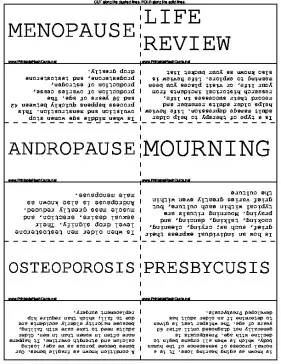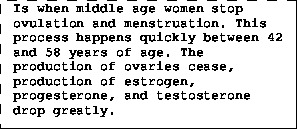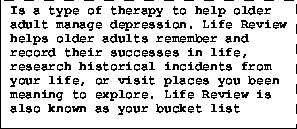

Disorders, issues, and problems faced by the aging and elderly are provided in these lifespan flash cards
There are 15 flash cards in this set (3 pages to print.)
To use:
1. Print out the cards.
2. Cut along the dashed lines.
3. Fold along the solid lines.
Sample flash cards in this set:




| Questions | Answers |
|---|---|
| MENOPAUSE | Is when middle age women stop ovulation and menstruation. This process happens quickly between 42 and 58 years of age. The production of ovaries cease, production of estrogen, progesterone, and testosterone drop greatly. |
| LIFE REVIEW | Is a type of therapy to help older adult manage depression. Life Review helps older adults remember and record their successes in life, research historical incidents from your life, or visit places you been meaning to explore. Life Review is also known as your bucket list |
| ANDROPAUSE | Is when older men testosterone level drop signify. Their sexual desire, erection, and muscle mass greatly reduced. Andropause is also known as male menopause. |
| MOURNING | Is how an individual express their grief, such as; crying, cleaning, cooking, talking, dancing, and praying. Mourning rituals are typical within each culture, but grief varies greatly even within the culture |
| OSTEOPOROSIS | A condition known as fragile bones. Our bones become porous as we age; losing calcium and strength overtime. It happens more often in women than in men. Older adults need to take care with falling, because majority elderly accidents are due to fall; which than require hip replacement surgery. |
| PRESBYCUSIS | is known as aging hearing loss. It is a normal process of senescence of the human body, which is when all organs begin to decline with age. Presbycusis is generally not diagnosed until after 60 years of age. The whisper test is given to determine if an older adult has developed Presbycusis. |
| OLDEST - OLD (OVER 85) | These elderly adult are dependent on other, such as a family member, or nursing home. |
| TELOMERES | Are the ends of chromosomes in our cells. The length of the chromosomes cell decreases after each duplication; correlates with longevity. |
| TERMINAL DECLINE | Is a complete decline of cognitive abilities just prior to death. |
| BEREAVEMENT | Is the state of mind or is the cause of the condition because the loss of death. It the shock and ah factor. |
| MORBIDITY | Is the Latin word for diseases. Morbidity refers to frequency of illnesses, impairment, chronic, or acute of our physical and psychological. Morbidity does not mean mortality. |
| HOSPICE | Is an alternative to hospital or nursing home care for terminal ill patients. A hospice provides assistance with pain management and allows patients to die with dignity. There are 2 principles for hospice care; each patient's decisions are respected, and family and friends are counseled. |
| GLAUCOMA | Is fluid buildup within the eye, damaging the optic nerve. This condition affects about 1% of adults in their 70s and 10% of adults in their 90s. Blindness from glaucoma is preventable if caught in the early stages. African- American and diabetes may develop glaucoma as early as 40 years of age |
| ELDERSPEAK | It is a patronizing way people communicate with older adults. It mimics baby talk, with simple short sentences, overstated words, repetition, and slow rate/high pitch speech. You'll find this type of speak in service field workers such as, social workers, restaurant, service employees. |
| GERONTOLOGY | Is the study of old age. Typically the gerontologists study older adults in community-dwelling, not individuals residing in nursing homes or other institutions. These adults are usually healthy, active, happy, and satisfied with their lives. |